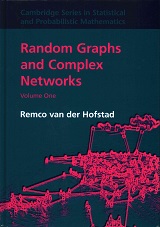
|
FreeComputerBooks.com
Links to Free Computer, Mathematics, Technical Books all over the World
|
|
- Title: Random Graphs and Complex Networks
- Author(s) Remco van der Hofstad
- Publisher: Cambridge University Press; 1st edition (December 24, 2016); eBook (Draft)
- Hardcover: 236 pages
- eBook: PDF (474 pages)
- Language: English
- ISBN-10/ASIN: 110717287X
- ISBN-13: 978-1107172876
- Share This:

|
This rigorous introduction to network science presents Random Graphs as models for real-world networks. Such networks have distinctive empirical properties and a wealth of new models have emerged to capture them. Classroom tested for over ten years, this text places recent advances in a unified framework to enable systematic study.
Designed for a master's-level course, where students may only have a basic background in probability, the text covers such important preliminaries as convergence of random variables, probabilistic bounds, coupling, martingales, and branching processes.
Building on this base - and motivated by many examples of real-world networks, including the Internet, collaboration networks, and the World Wide Web - it focuses on several important models for complex networks and investigates key properties, such as the connectivity of nodes.
Numerous exercises allow students to develop intuition and experience in working with the models.
About the Authors- Remco van der Hofstad is Full Professor of Probability at Eindhoven University of Technology and Acting Scientific Director of the European Institute for Statistics, Probability, Stochastic Operations Research and their Applications (Eurandom).
- Probability, Stochastic Process, Queueing Theory, etc.
- Graph Theory
- Geometry and Topology
- Statistics, and SAS Programming
- Computer Networks and Communications

- Random Graphs and Complex Networks (Remco van der Hofstad)
- The Mirror Site (1) - PDF
- The Mirror Site (2) - PDF
-
 Random Walks and Electrical Networks (Peter G. Doyle, et al.)
Random Walks and Electrical Networks (Peter G. Doyle, et al.)
A popular account of the connection between Random Walks and electric networks. Electric networks is part of the much broader subject of general network theory which is itself a branch of the mathematical subject of graph theory.
-
 Planar Maps, Random Walks and Circle Packing (Asaf Nachmias)
Planar Maps, Random Walks and Circle Packing (Asaf Nachmias)
This open access book focuses on the interplay between random walks on planar maps and Koebe’s circle packing theorem. Entirely self-contained. Many classical proofs have been simplified and streamlined. Contains numerous useful exercises.
-
 Probability on Trees and Networks (Russell Lyons, et al.)
Probability on Trees and Networks (Russell Lyons, et al.)
This book is concerned with certain aspects of discrete probability on infinite graphs that are currently in vigorous development. Of course, finite graphs are analyzed as well, but usually with the aim of understanding infinite graphs and networks.
-
 Network Science (Albert-László Barabási)
Network Science (Albert-László Barabási)
Illustrated throughout in full colour, this pioneering textbook, spanning a wide range of topics from physics to computer science, engineering, economics and the social sciences, introduces network science to an interdisciplinary audience.
-
 A Survey of Statistical Network Models (Anna Goldenberg, et al.)
A Survey of Statistical Network Models (Anna Goldenberg, et al.)
This book aims to provide the reader with an entry point to the voluminous literature on statistical network modeling. It guides the reader through the development of key stochastic network models, touches upon a number of examples and commonalities.
-
 Graph Theory and Complex Networks (Maarten van Steen)
Graph Theory and Complex Networks (Maarten van Steen)
This book aims to explain the basics of graph theory that are needed at an introductory level for students in computer or information sciences. It also aims to provide an introduction to the modern field of network science.
-
 Digraphs: Theory, Algorithms and Applications (J. Bang-Jensen)
Digraphs: Theory, Algorithms and Applications (J. Bang-Jensen)
This book is an essential, comprehensive reference of Digraphs covering the theoretical aspects of the subject, focus on applications which include quantum mechanics, bioinformatics, embedded computing, and the travelling salesman problem.
-
 Network Calculus: Deterministic Queuing Systems for the Internet
Network Calculus: Deterministic Queuing Systems for the Internet
Network Calculus is a set of recent developments that provide deep insights into flow problems encountered in the Internet and in intranets. It shows how it can be applied to the Internet to obtain results that have physical interpretations of practical importance.
-
 Paths: Why is Life Filled with so many Detours?
Paths: Why is Life Filled with so many Detours?
This book explores the amazing similarity between paths taken by people and many other things in life, and its impact on the way we live, teach and learn. Offering insights into the new scientific field of paths as part of the science of networks, etc.
-
 Networks, Crowds, and Markets: a Highly Connected World
Networks, Crowds, and Markets: a Highly Connected World
It looks at economics, sociology, computing and information science, and applied mathematics to understand networks and behavior, and addresses fundamental questions about how the social, economic, and technological worlds are connected.





